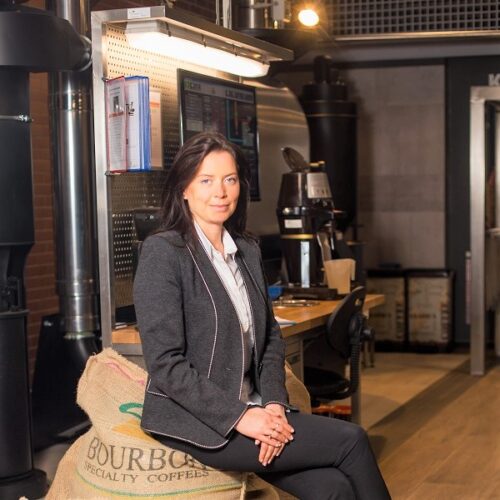Currently, e-commerce solutions as a distribution channel, are a common method of customer access to the company’s assortment. An active lifestyle combined with lack of time, convenience, and limited access to other methods of product acquisition make consumers more likely to use such solutions. So it is natural for businesses that want to be a major player in the retail market to have online stores or to consider implementing them. In addition to access to the segment of modern customers, an undoubted advantage is also an interesting form of advertising own products.
Freshly roasted coffee reaching customers faster
The forms of sales of goods and services at Strauss Cafe were based on the indirect sales of products and goods in the retail segment through retail chains and traditional trade as well as direct sales to HoReCa channel customers through its own network of catering companies. The decision to start selling via the e-commerce channel was made in view of the prospective development of this channel and was also part of the Strauss Cafe development strategy, which, alongside B2B sales, assumed reaching also the final consumer of coffee directly. The concept of the online store is based on freshly roasted coffee, which is delivered to its consumer straight from a coffee roasting plant (MK Cafe Fresh Coffee Manufactory). Carrying out direct sales and controlling the entire production and delivery process, the company is able to guarantee the maximum freshness of the coffee (each package contains a hand-stamped date of roasting a given batch of coffee).
The decision to enter the market of retail sales through an e-store involved the introduction of completely new business processes. In this model, you need to be able to quickly check the availability of a product online so that the sales process can run smoothly. For this purpose, the company decided to implement the Magento web-based trading platform in integration with SAP.
First steps
In November 2015, Strauss Cafe Poland decided to entrust BCC (now All for One Poland) with the development of a plan to implement an e-store interface in SAP. The choice of BCC was not accidental because Strauss is BCC’s long time customer, so BCC consultants know the customer’s processes and needs very well.
The project was prepared on the basis of analysis of the customer’s requirements. The assumptions were related to changes in the SD area (configuration side), such as a new sales area, but the most important issue for the whole integration was the development of a process and interface connecting the Magento platform with SAP. After the acceptance by the customer, the development and customization of the solution was commenced.
The project work was started at the end of January 2016, and the first orders from mkfresh.pl to SAP were fulfilled 4 months later.
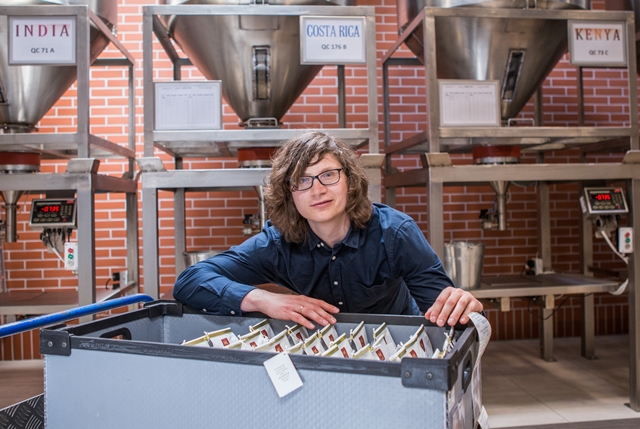
Zbigniew Iwański, E-Commerce Manager, Strauss Cafe Poland
The store serves both individual and B2B customers. Initially, the store was more targeted to the individual customer, however now special offers of cooperation for the B2B segment with a dedicated customer care are being introduced. In this way, Strauss Cafe acquires many customers that are companies regularly ordering coffee for their employees.
Zbigniew Iwański, E-Commerce Manager, Strauss Cafe Poland
Integration of the process with SAP
Stage I – MATERIAL INQUIRY
The process starts at the online store where an order is placed. The customer selects the required goods and their quantity. The order is processed by the online store.
The next step is to check the availability of the product stock and prepare prices. This step is the first method developed by BCC in the process, based on the Web Service.
Based on the rules set out with Strauss at the analysis stage, verification procedures check the possibility of setting up a sales order (including the availability of materials, checking prices, VAT rates, etc.) and prepare a relevant feedback (including goods prices) so that any online platform supporting an e-store can process such data.

Stage II – ORDER
Upon receipt of a positive feedback, the customer selects a payment method (thereby selecting a process in which their order will be handled). The web-based platform processes data in such a way so as to enable subsequent integration procedures to use them. The stage begins with the automatic creation of a sales order. Using the interface methods developed by BCC (now All for One Poland), the SD order is created without user intervention. Of course, this is not done without validation or complex configurations, as they were established at the concept stage. As part of the functionality of setting up an order (interface), the system enables, among other things, the fulfillment of a one-time customer’s order. This solution does not require setting up a file of customers, who perhaps will order a product only once. It saves not only time, but also, considering the technical aspect, the cost of maintaining a “cluttered" database.
In the next steps, the following functions are executed:
- If the customer chooses the electronic payment method, a delivery lock is set until the information about the payment successfully made by the customer is provided by the e-commerce platform. In the case of a COD order, it is released for delivery.
At this stage, it is worth noting that in the process of e-store integration, deliveries are created automatically (Auto-Delivery).
- If the customer chooses an electronic payment, an advance payment invoice will be automatically created for the order. The functionality of advance payment invoices in the aspect of the online store was adjusted on the basis of the existing solution. At the final stage of integration, the advance payment invoice is automatically set off against the final invoice provided to the customer.
- Moreover, it is made sure that the amount of the discount granted does not exceed the safe level defined by Strauss Cafe.
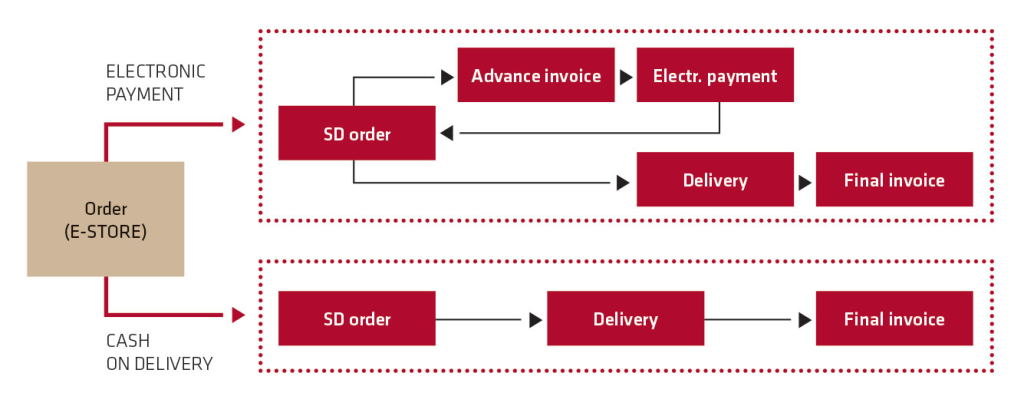
Stage III – PAYMENT CONFIRMATION (for electronic payments only)
If at the stage of placing an order the customer in the online store chose an electronic payment method, the order in SAP is locked for delivery to make sure that the payment has actually been made, as it may happen that the electronic payment is rejected by the operator. At this stage, an interface method was also prepared for Strauss Cafe. It analyzes the information provided by the online platform (it is used by the payment operator for communication). If the feedback is positive (the payment was made correctly), the interface unlocks the order in the next step, which automatically results in creating a delivery. This solution definitely accelerates the purchase process. It also allows the system operators to avoid continuous monitoring of the system.
In addition, at the stage of implementation, a mechanism was developed to pass the process to the next permitted step if for some reason (e.g. days off, calendar days, etc.) the delivery has not been created by the system.
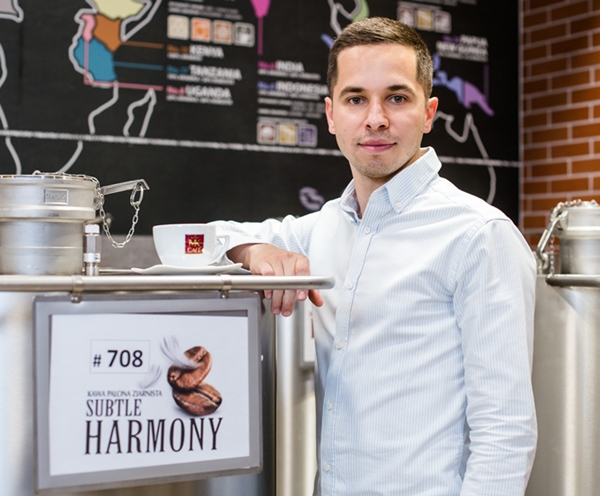
Marek Jakubczak, Junior IT Systems Analyst, Strauss Cafe Poland
When we were thinking about an online store, our most important objective was the shortest time of delivery to the customer. In the case of freshly roasted coffee this is particularly important. The integration of the store with the SAP system used by our company has significantly streamlined the ordering process.
Marek Jakubczak, Junior IT Systems Analyst, Strauss Cafe Poland
Stage IV – DELIVERY, TRANSPORT AND FINAL INVOICE
The creation of delivery documents results in calling up a further workflow in SAP, according to the configuration prepared at the implementation stage. As part of the process, it is worth noting an automatic connection with the customer’s transport system.
The last step is to create an invoice. Upon confirmation of the consignment delivery, the SAP system marks the process as ready for invoicing. The interface method of invoicing created as part of integration with the e-store performs the following operations:
- Creating a sales invoice based on the configuration defined at the implementation stage.
- In the case of an invoice for the process with cash on delivery, a final invoice is created,
- In the case of an invoice for the electronic payment process, the system automatically settles the earlier advance payment invoice to submit to the customer the final value for payment.
- The generated output information is automatically converted to a PDF file and made available for download through the e-commerce platform.
- With interface methods, the e-commerce platform receives information on the success of the invoice issue, along with the PDF attachment, which sends an e-mail to the customer in the next step.
- Posting a sales invoice, including also advance payment invoices and their settlement.
- During invoice posting, the vouchers used are posted to GL accounts upon their occurrence.
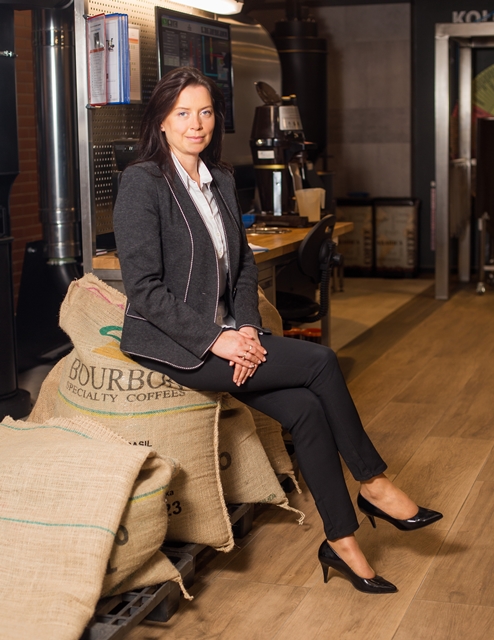
Ewa Kędra, IT Head, Strauss Cafe Poland
With e-Commerce, we can reach directly all consumers, including the most demanding ones, omitting agents and shortening the sales cycle, which allows us to deliver the highest quality product (including absolute freshness, unique composition, etc.) at an attractive price. Our expectations included also making consumers aware that freshly roasted coffee offers a taste and aroma that is incomparable to the product available on the store shelf. The greatest satisfaction is the increasing number of customers who find out that it is worth ordering coffee directly from the Manufactory. At present, every potential customer is just only a few clicks away from ordering freshly roasted coffee, which is shipped to any place in Poland within 24 hours of its ordering, regardless of our distribution in the region.
The store synchronizes with SAP the stock levels and SKU list, including prices, weights, etc. In addition, the posting process (generating invoices, releasing orders for fulfilment in the warehouse) is also carried out with participation of SAP. The use of the SAP system and its integration with the store have enabled the automation of many processes that, for example for retail orders, were handled manually. This is crucial for the operation and liquidity of the online store. As a result, we are able to guarantee smooth 24/7 operation, as well as shorten the entire process of order fulfilment so that the time from the order receipt to shipment is not longer than 24h.
Ewa Kędra, IT Head, Strauss Cafe Poland
We’ve built a bridge
To sum up, the integration of the SAP system with the e-commerce platform for Strauss Cafe Poland has been made with the involvement of many elements of SD areas, and it has automated many processes, which greatly improved work. In addition to the implementation of the integration of SAP with the e-commerce platform, Strauss Cafe employees have also received post-implementation support, which has allowed them to customize the product to meet the needs arising during actual work. This includes the adjustment of printouts and taking into account additional comments submitted by customers. The mechanisms reporting and monitoring e-commerce processes have also been developed.
All the processes make up a complete product that fully utilizes the positive qualities of modern web technologies while integrating them with existing SAP processes. This product can be called a bridge connecting two independent areas, which in a few years may be the predominant business area of enterprises.


